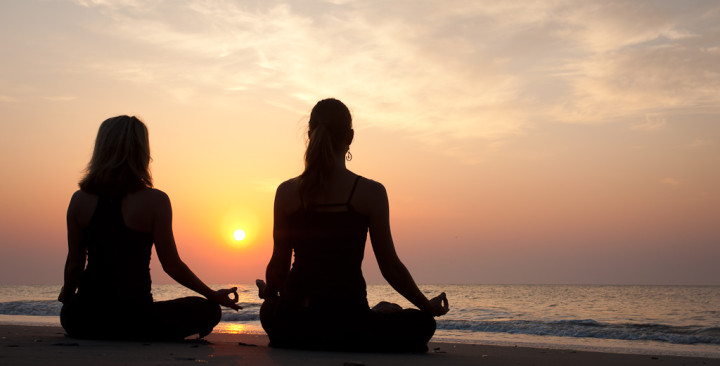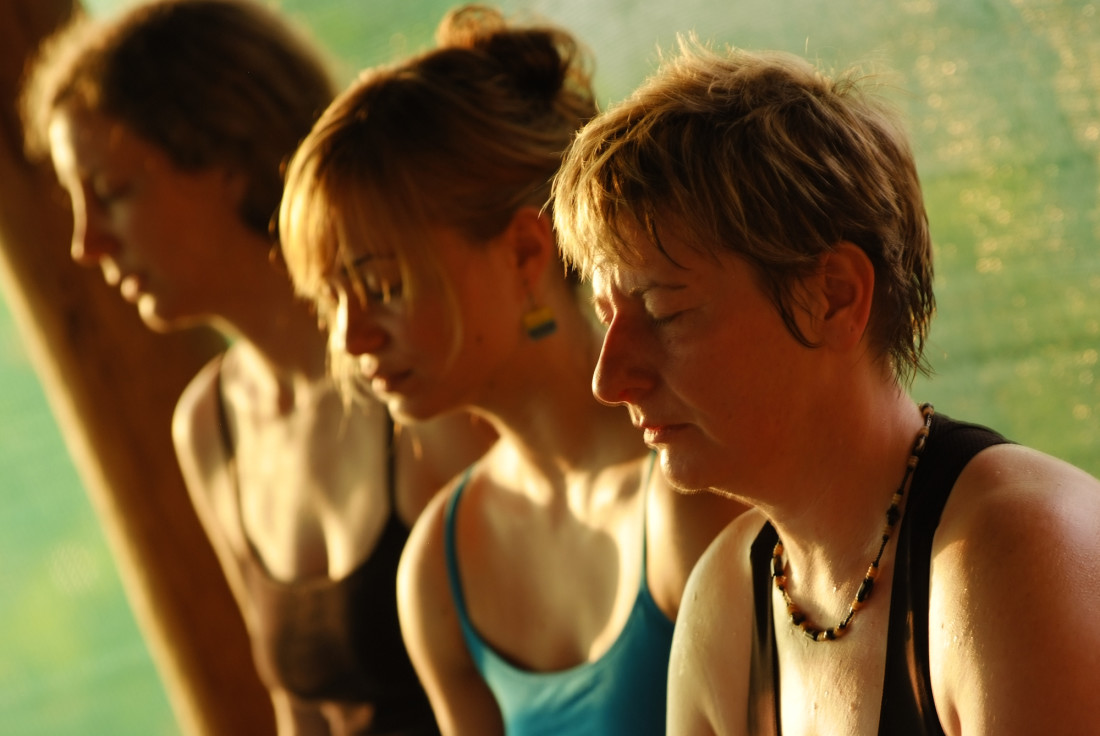We all know someone who could use a break — and quite possibly, that person is you.
We know how to pack our days full of activities, but how many of us really know how to stop, take time off and experience true rest? Instead, we tend to just keep going at a faster pace, doing our best to convince ourselves that this is “normal.”
More and more folks, though, are finding that by consciously taking time away from their daily routine — hitting the reset button, if you will — they can come back to their daily life renewed, with a greater sense of well-being.
Joshua Canter, owner of True Nature Education in Asheville, has seen firsthand the positive impact taking focused time off can have.
While on retreat in Thailand, Canter spoke with one of the monks, who told him, “You in America have all these problems and can pay for therapists. Here, when someone has a problem, we put them in a meditation hut for five days and bring them food. We get done in five days what you get done in a year.”
Tough words, but they hit home for Canter. “Taking breaks isn’t something we learn how to do in our culture,” he notes.
Deeply moved by his experiences, Canter became passionate about sharing what he’d learned with others. Today, he facilitates retreats in Costa Rica and encourages others to lead retreats and simply give themselves “me” time as well.
Opting to spend time with yourself is invaluable, Canter and others say. Many find that this magical time away evokes a sense of peace that can enhance their ability to relate harmoniously to family, friends, colleagues and whatever life throws their way.
“I think of the retreat as a sponge,” says Canter. “You go on a retreat and saturate your sponge, and you have time to tap into who you really are. Then you go back into your life, and after a while it dissipates, and you need to go back to recharge or replenish.”

Beyond vacations
For most folks, a vacation is the closest they may come to going on retreat, but in Canter’s view, these are two very different things. On a vacation, “We travel somewhere, we go to a hotel, we are indulgent, and it’s an experience that is somewhat replicated year after year,” he explains. “The retreat experience, in many ways, is an evolution of the standard vacation experience” that can bring balance back into our lives.
And due to the fullness of our day-to-day reality, which calls us “out” into the world to run errands, interact with others, make sure the kids are taken care of, fix dinner and so on, that kind of enhanced experience, he suggests, may be an essential antidote.
The retreat is a time to focus on your own internal environment. What’s going on in my mind? How is this influencing my emotions? And what effect is it having on myself and others?
“By taking the time to pause, you have the chance to see what lies beneath the surface,” notes Canter. “You quickly find out what habits in your life are working and which ones aren’t.”
This insight into the “true nature of yourself,” he maintains, can lead to significant changes in your life. “You realize that you have another chance to make those tweaks.”
Shelli Stanback, board president of the nonprofit OM Sanctuary, agrees. “When people are given the opportunity to disconnect, they quickly see where their addictions are; they feel where they’re overstimulated,” she says.
“It is integration that’s missing for people in our culture. Even when you go to a class downtown, class ends, you step out on the street and, naturally, your nervous system becomes set for safety: There’s an underlying sense of overwhelm.”
When Stanback first launched OM, most of the clients were couples visiting Asheville who’d mistaken the center for a bed-and-breakfast. “They were surprised and somewhat upset when they found out there were no TVs in the rooms,” she recalls.
But the idea, notes Stanback, is to “disconnect to reconnect.” Accordingly, OM Sanctuary offers “rest-and-renewal stays” — personalized retreats where you choose how you want to spend your free time while enjoying a serene, distraction-free environment.
“People are thankful not to have a scheduled program,” she explains. “They decide to stay for more days, maybe taking a holistic class and enjoying the nature trail.”
And, shielded from the bombardment of modern technology, “People are discovering themselves and others. They’re connecting to nature and their own natural rhythms.”
As Canter sees it, a retreat is really the ultimate vacation, because it spreads into all aspects of your life. “It’s kind of like the Thich Nhat Hanh quote: ‘The greatest gift you can give to the planet is to cultivate peace within yourself.’ At first, I thought that quote was rather self-absorbed,” Canter reveals, “but I realized that a retreat really is the best gift you can offer yourself and others, because you come home clearer, stronger and more ready to serve, whatever your calling may be.”
A remedy for Western culture?
“A whole lot of intention goes into a retreat,” says Canter, adding that most such settings are designed to “make you feel comfortable, nourished and supported.”
With staff present to prepare your meals and a space devoted to practice, each participant has “an opportunity to unplug and to retreat within.” And with the logistics taken care of and distractions minimized, there is literally nothing else to do; it is a time for self-care, he says.
Sid Jordan, director of the nonprofit Prama Institute, and Ramesh Bjonnes, director of the affiliated Prama Wellness Center, say their clients, too, are primarily seeking “to retreat from the pressures of daily life and reset their priorities.”
Both branches of Prama, say Jordan and Bjonnes, “cater to the individual and collective needs of ‘retreaters,’” helping them “develop or rejuvenate a disciplined practice that supports an improved quality of life” once they’re back in daily life.
And whether you sign up for an organized retreat, decide to lead one or simply plan some solitary time at home, it’s a chance to be with yourself and go deeply into what it means to be alive — a rare opportunity for most of us. As Canter says, “The retreat can be one of the greatest remedies for Western culture right now.”
In that spirit, here’s some additional advice from Canter:
Mountain Xpress: Many people reading this may think, “I don’t have time for that,” or “This is not for me.” Are there options for home practice?
Canter: Definitely. You can make your own personal home retreat and start to weave more mindfulness into your daily life. For example, when you hear your phone ring, you can pause and let it ring three times before answering. During this time, you are simply aware that the phone is ringing.
A retreat can be anything — having tea at Dobra, going on a walk in nature or taking five minutes in the morning for yourself. It takes intention and some level of discipline to plan a retreat for yourself.
What may be most accessible for people is a half-day in-home retreat. Turn off your devices, put your phone away and have a period of intentional silence, either alone or with one other person. You could share a quiet meal, walk quietly with a friend, listen to a podcast on a teaching you find valuable or visit a place that reflects retreat to you. Asheville has a lot of those.
There are obviously many holistic teachers and professionals in Asheville, some of whom might be interested in leading a retreat themselves. What advice would you give them?
It’s always helpful to go on a retreat before you lead one. You will start to understand the groundwork and see how you react to the retreat experience. This will give you valuable insight into how others might react. We’re all students and teachers in life, so if you feel inspired to be a retreat leader, you have to just dive in and take the leap.
There are many subtleties to facilitating your optimal retreat. I would first recommend that you arrive early to set the space and make yourself at home. Check out the little things, like leaving a flower in someone’s room or having candles. These are subtle actions to prepare the space.
Some of the best advice I can offer is to have a plan and let it shift organically. Things naturally come up during a retreat, especially about midway through. If you take this time to step up and hold space, to follow through until the end, you’ve done your best. As a leader, prepare students for integration back into their lives, as well, and debrief yourself: What worked and what didn’t? This way, you don’t have to reinvent the wheel.
MORE INFO
To learn more about the retreat centers featured here, visit truenatureeducation.com, omsanctuary.org, pramawellnesscenter.org or pramainstitute.org.




There are very few facilities for a simple, quiet, contemplative retreat in the Asheville area – as far as I know. OM Sanctuary is priced FAR beyond what most people can afford – even if you want to bring your own food, cook it yourself and do not need any assistance from the owners.
If you are looking for a good business venture, and you can figure out how to create a retreat facility that is affordable by a relatively large number of people, you will be a resounding success. The market is there – people are, in fact, desperate for this kind of thing. Unfortunately, retreats have been designed for people of “means.” This article refers primarily to Eastern/inspired retreats, but even the Christian retreat centers around here are quite costly for someone wishing to do a private, quiet, simple contemplative retreat.
Inexpensive motels (that provide cable, breakfast and other amenities) only charge 45 to 70. Why in the world can’t someone put together a room – a simple room, no TV, nothing but a bed and closet, or even just a small chest of drawers – and charge the same? (many people would come for retreat just for one night without the need for cooking facilities – it would simply be an opportunity to do a complete or partial fast as well. Walk, do yoga/qigong, meditate, read, and be generally quiet. Ecstatic, simple, contemplation.
Someone out there with a good business mind and a kind, gentle, contemplative entrepreneurial spirit should be able to figure this one out.
AWAKE: The Life of Paramhansa Yogananda
http://gathr.us/screening/11399